| Op-Ed: European Commission – Press release |
Comment: នីតិវិធីដកកិច្ចអនុគ្រោះពន្ធEBAនេះគឺចាប់ផ្តើមមានឥទ្ធិពលតាំងពីសារព្រមានដំបូងរបស់លោកស្រីម៉ាលស្ត្រមម្លេះពីព្រោះជាចិត្តសាស្ត្រពាណិជ្ជកម្ម ពាណិជ្ជករមានការអល់អែកក្នុងការបន្តាក់ទុននិងពង្រីកទុនរបស់ខ្លួននៅប្រទេសកម្ពុជារួចទៅហើយ។ ពាក្យពេជ្រតំណាងអោយសហគមអុឺរ៉ុបគឺអាចយកជាការបាននិងមិនមែនជាប្រជាភិថុតិដូចទំលាប់មេដឹកនាំខ្មែរបានធ្វើកន្លងមកនោះទេ។ ពាណិជ្ជករមានភាពមុឺងម៉ាត់ណាស់ចំពោះបញ្ហានេះ។ អ្វីដែលអាភ័ព្វនោះគឺលោកហ៊ុន-សែនដែលបានធ្វើនយោបាយប្រជាសាកលនិយមឬប្រជាភិថុតិជាមួយកម្មករកន្លងមក កំពុងរុញច្រានអោយកម្មករកាត់ដេរខ្មែរជិតមួយលាននាក់ធ្លាក់ខ្លួនក្រដើម្បីដោះដូរជាមួយនឹងការរក្សាអំណាចរបស់បុរសខ្លាំងកម្ពុជាតែប៉ុណ្ណោះ។ ជាការកត់សំគាល់ លោកហ៊ុន-សែនកំពុងតែស្ថិតនៅឯកោឯកាម្នាក់ឯងបន្តិចម្តងៗ។ គាត់ឯកោឯកាពីសមាជិកអ្នកស្រឡាញ់ជាតិពិតប្រាកដក្នុងជួរគណបក្សរបស់គាត់ គាត់ឯកោឯកាពីសហគមអន្តរជាតិមានសហរដ្ឋអាមេរិកជាដើម គាត់ឯកោឯកាពីប្រទេសជិតខាងរបស់កម្ពុជាមានថៃនិងវៀតណាមក៏ដូចជាសមាគមអាស៊ានជាដើម។ល។និង។ល។
Cambodia: EU launches procedure to temporarily suspend trade preferences
Brussels, 11 February 2019
The EU has today started the process that could lead to the temporary suspension of Cambodia’s preferential access to the EU market under the Everything But Arms (EBA) trade scheme. EBA preferences can be removed if beneficiary countries fail to respect core human rights and labour rights.
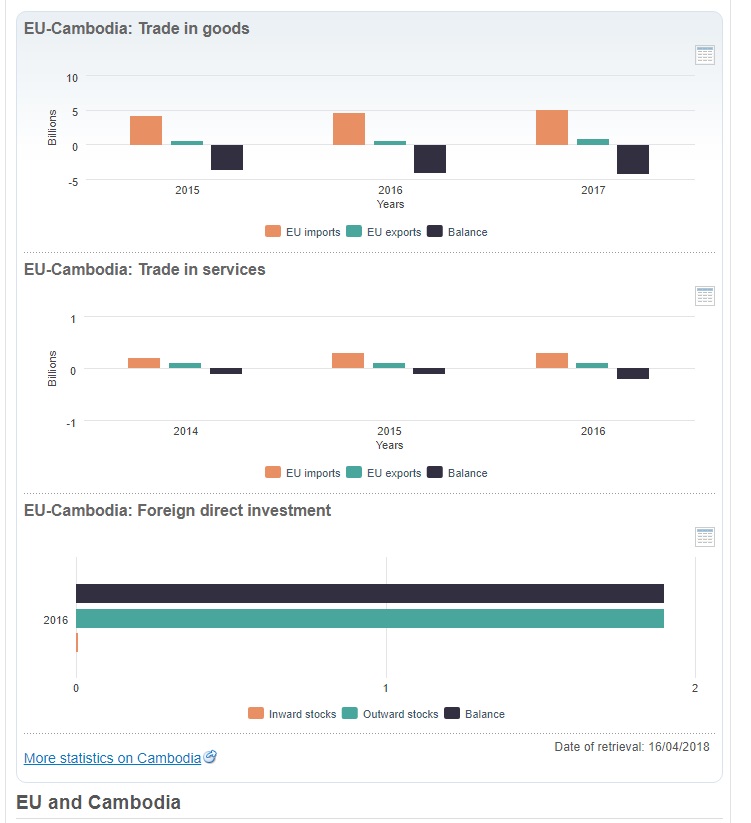
Launching the temporary withdrawal procedure does not entail an immediate removal of tariff preferences, which would be the option of last resort. Instead, it kicks off a period of intensive monitoring and engagement. The aim of the Commission’s action remains to improve the situation for the people on the ground.
High Representative for Foreign Affairs and Vice President of the European Commission Federica Mogherini said: “Over the last eighteen months, we have seen the deterioration of democracy, respect for human rights and the rule of law in Cambodia. In February 2018, the EU Foreign Affairs Ministers made clear how seriously the EU views these developments. In recent months, the Cambodian authorities have taken a number of positive steps, including the release of political figures, civil society activists and journalists and addressing some of the restrictions on civil society and trade union activities.However, without more conclusive action from the government, the situation on the ground calls Cambodia’s participation in the EBA scheme into question. As the European Union, we are committed to a partnership with Cambodia that delivers for the Cambodian people. Our support for democracy and human rights in the country is at the heart of this partnership.”
EU Commissioner for Trade Cecilia Malmström said: “It should be clear that today’s move is neither a final decision nor the end of the process. But the clock is now officially ticking and we need to see real action soon. We now go into a monitoring and evaluation process in which we are ready to engage fully with the Cambodian authorities and work with them to find a way forward. When we say that the EU’s trade policy is based on values, these are not just empty words. We are proud to be one of the world’s most open markets for least developed countries and the evidence shows that exporting to the EU Single Market can give a huge boost to their economies. Nevertheless, in return we ask that these countries respect certain core principles. Our engagement with the situation in Cambodia has led us to conclude that there are severe deficiencies when it comes to human rights and labour rights in Cambodia that the government needs to tackle if it wants to keep its country’s privileged access to our market.”
Following a period of enhanced engagement, including a fact-finding mission to Cambodia in July 2018 and subsequent bilateral meetings at the highest level, the Commission has concluded that there is evidence of serious and systematic violations of core human rights and labour rights in Cambodia, in particular of the rights to political participation as well as of the freedoms of assembly, expression and association. These findings add to the longstanding EU concerns about the lack of workers’ rights and disputes linked to economic land concessions in the country.
Today’s decision will be published in the EU Official Journal on 12 February, kicking off a process that aims to arrive at a situation in which Cambodia is in line with its obligations under the core UN and ILO Conventions:
– a six-month period of intensive monitoring and engagement with the Cambodian authorities;
– followed by another three-month period for the EU to produce a report based on the findings;
– after a total of twelve months, the Commission will conclude the procedure with a final decision on whether or not to withdraw tariff preferences; it is also at this stage that the Commission will decide the scope and duration of the withdrawal. Any withdrawal would come into effect after a further six-month period.
High Representative/Vice-President Mogherini and Commissioner Malmström launched the internal process to initiate this procedure on 4 October 2018. Member States gave their approval to the Commission proposal to launch the withdrawal procedure at the end of January 2019.
Background
The Everything But Arms arrangement is one arm of the EU’s Generalised Scheme of Preferences (GSP), which allows vulnerable developing countries to pay fewer or no duties on exports to the EU, giving them vital access to the EU market and contributing to their growth. The EBA scheme unilaterally grants duty-free and quota-free access to the European Union for all products (except arms and ammunition) for the world’s Least Developed Countries, as defined by the United Nations. The GSP Regulation provides that trade preferences may be suspended in case of “serious and systematic violation of principles” laid down in the human rights and labour rights Conventions listed in Annex VIII of the Regulation.
Exports of textiles and footwear, prepared foodstuffs and vegetable products (rice) and bicycles represented 97% of Cambodia’s overall exports to the EU in 2018. Out of the total exports of € 4.9bn, 99% (€ 4.8bn) were eligible to EBA preferential duties.
For More Information
MEMO: EU triggers procedure to temporarily suspend trade preferences for Cambodia
Generalised Scheme of Preferences
===========
EU starts process to hit Cambodia with trade sanctions
Op-Ed: Reuters
BRUSSELS, Feb 11 (Reuters) – The European Union started on Monday an 18-month process to end Cambodia’s preferential trade access to the bloc over its record on human and labour rights and democracy.
The European Commission, which coordinates trade policy for the 28-member EU, said that its decision would be published in the EU official journal on Feb. 12, triggering a countdown that would run until August 2020.
The country benefits from an “Everything but Arms” (EBA) status, which allows the world’s poorest countries to sell any goods tariff-free into the EU, except weapons.
EU foreign affairs chief Federica Mogherini said in a statement that the EU recognised the Cambodian authorities had taken positive steps in recent months, such as releasing political figures and addressing some restrictions on civil society and trade union activities.
“However, without more conclusive action from the government, the situation on the ground calls Cambodia’s participation in the EBA scheme into question,” she said.
The process to remove the EBA status consists of six months of monitoring and talks with the Cambodian authorities followed by a three month period for the EU to produce a report on its findings.
After a total of 12 months, the European Commission would conclude the procedure with a decision on whether or not to withdraw the trade preferences. Any withdrawal would take effect after a further six months. (Reporting by Philip Blenkinsop, editing by Robin Emmott)
=====
‘If the factory closes what could I afford to eat?’
Op-Ed: BBC
By Kayleigh Long and Meta KongBusiness reporters
- 13 December 2018
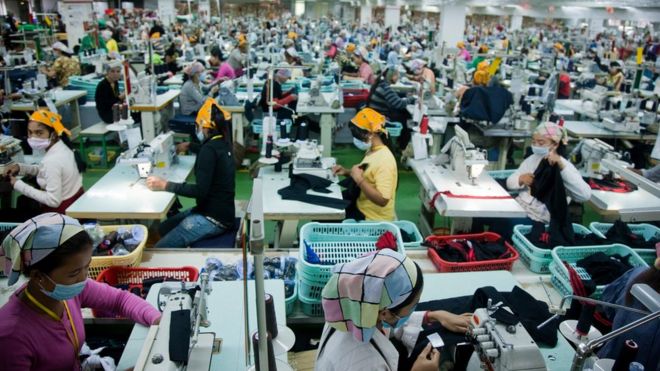
Sao Run is worried that if the clothing factory where she works closes down she won’t be able to feed herself and her son.
A 34-year-old widow, she has spent almost 13 years making coats and jackets at a facility on the outskirts of Cambodia’s capital, Phnom Penh.
With overtime she can earn up to $250 (£200) a month, but the future of the workshop and others like it in the country is now uncertain due to a continuing political dispute between the European Union (EU) and Cambodia.
Cambodia’s garments manufacturing sector has boomed in recent years, in no small part due to the EU granting the country’s exports tariff-free access to Europe, starting back in 2012.
This has led to about 200 international fashion brands now using more than 600 factories in the country, lured by both the country’s low wages, and the fact they don’t have to pay any duties when exporting to the EU.
However, at the start of October the EU warned that Cambodia’s tariff-free access to the European single market could come to an end if the government did not improve political freedom and human rights in the country.
EU Trade Commissioner Cecilia Malmstrom said that the EU was launching a six-month review of the situation in Cambodia, and that unless Phnom Penh showed “clear and demonstrable improvements, this would lead to suspension of trade preferences” within 12 months.
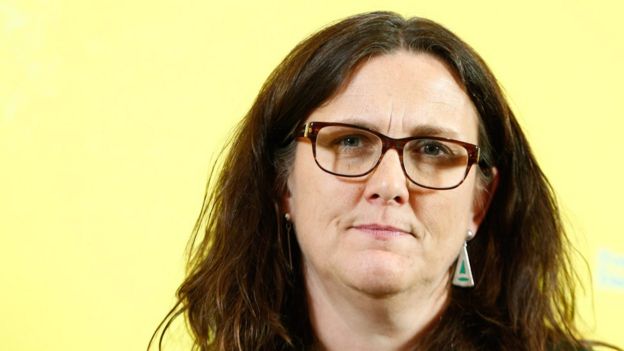
Her comments were a response to what both the EU and US see as increasingly autocratic behaviour by the Cambodian government of Prime Minister Hun Sen, who has been in power since 1985.
In July his Cambodian People’s Party won all 125 seats in parliament, helped by the fact that the main opposition party – the Cambodia National Rescue Party (CNRP) – was officially shut down by the country’s Supreme Court in November 2017.
The court ruling was based on a complaint by Hun Sen’s government that the CNRP was conspiring with the US to overthrow it, something it denied.
Ken Loo, secretary general of the Garment Manufacturers Association in Cambodia, says that the EU’s threat has “heightened concerns” that international fashion firms could take their manufacturing business to other countries.
This would be a major concern for Cambodia when you consider the numbers involved. Mr Loo says that the industry employs more than 700,000 people, 85% of whom are women.
Meanwhile, official EU figures show that Cambodian clothing exports to Europe reached €3.8bn ($4.3bn; £3.4bn) in 2017. That is 44% of all Cambodia’s $9.6bn exports last year.
No wonder then that there are fears over the possibility of significant factory closures and job losses, not only if the EU does end Cambodia’s tariff-free status, but simply as a result of the threat.
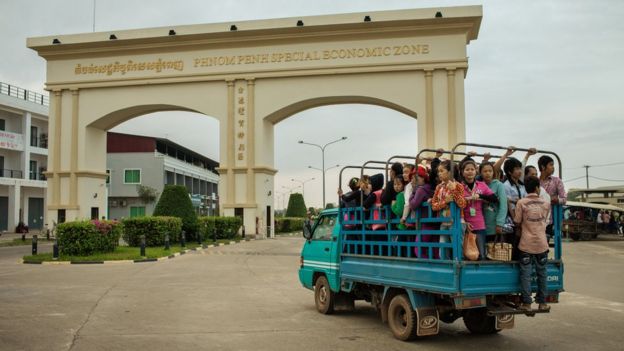
George McLeod, an economic and political risk analyst based in Bangkok, says that Western clothing firms could easily switch production to Bangladesh, Vietnam or Indonesia.
For Sao Run, who has a three-year-old son to support, this is now a real concern. “The local union in our factory told us that the factory could close if the [EU] taxes are high,” she says.
“For me, if the factory closes, what could I afford to eat?”
Global Trade
More from the BBC’s series taking an international perspective on trade:
- Will Opec defy Trump’s call for low oil prices?
- Are free ports the future?
- Choppy waters for Greek shipping sector
- Is the Arctic set to become a main shipping route?
Another clothing industry factory worker, Yon Chansy, 24, says that she found out about the EU’s threat via Facebook, and that she is also now worried she may lose her job.
“I could consider migrating to Thailand if the situation in our country is very bad,” she says.
For its part, the Cambodian government may now be prepared to compromise, but whether it does enough remains to be seen.
Last week the country’s parliament (in which the government holds all the seats) said it would review a ban on more than 100 members of the opposition CNRP, but no timetable was given. Nor was there any indication of whether fresh elections would be held, or if the leader of the CNRP would be released from house arrest.
Meanwhile, the government has been downplaying the importance of the EU market. Ministry of Industry and Handicraft spokesperson Oum Sotha told the BBC: “The market of Cambodia does not solely depend on Europe, we have a lot of markets.”
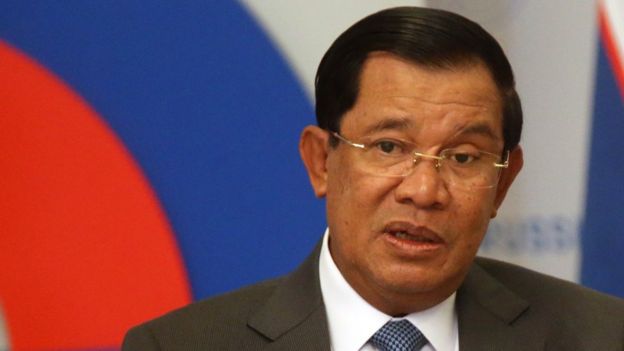
Sebastian Strangio, journalist and author of a book called Hun Sen’s Cambodia, says the Cambodian government faces a real dilemma over the EU issue.
“The problem is that the ‘clear and demonstrable improvements’ the EU is demanding would, almost by definition, weaken Hun Sen’s hold on power,” he says.
“This he will never accept. It is therefore hard to see how the two sides will find common ground. Any concessions the Cambodian government makes will fall short of meaningful democratic reforms.
“Whether or not the EU will accept something cosmetic remains to be seen.”
A source at the European Commission says the announcement that the ban on the Cambodian opposition might be lifted was “a first positive step”.
“However, this needs to produce concrete and substantial results to alleviate the EU’s serious concerns. The implementation of this announcement and concrete changes on the ground would be among the deciding factors,” she added.
Tieng Ratana, a mother-of-three who works at a clothing factory to the west of Phnom Penh, says she hopes that the Cambodian government will think of people like her.
“We work very hard, so I really want our leaders to think about the workers first,” she says.
